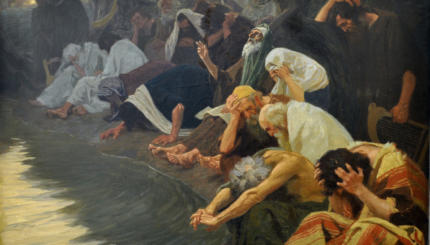Commentary on Parashat Achrei Mot, Leviticus 16:1-18:30
Leviticus 18 is one of two passages in the (the other being Leviticus 20) that consists of sexual regulations meant to distinguish Israel from the surrounding nations and make it a holy people. Although the prohibitions in our passage have had a profound impact on Western sexual morality, its assumptions are remote from — and in some cases even abhorrent to contemporary sensibilities.
First of all, Leviticus evaluates sexual behaviors not in terms of the emotional and relational dimensions of sexual experience that are so central to judgments about sexual morality today, but in terms of the categories of purity and pollution. The purpose of anti-pollution laws is to impose structure on the chaos of experience by ensuring that social and symbolic boundaries are respected and that things conform to their proper class. Leviticus 18 forbids a series of discrete behaviors that supposedly cause defilement and thus disrupt the social/religious world, but it offers no positive understanding of holy sexuality.
Second, if we look at the social order that the Levitical anti-pollution laws protect, it seems to consist of extended patriarchal families in which the honor and authority of male heads of household is the primary social value. Verses 7 and 8 do not forbid the father to sexually violate his child bur rather forbid the son to violate the sexuality of his father by committing incestuous adultery with the father’s wife.
The verses instruct the less powerful party not to dishonor the powerful by treating the wife’s sexuality simply as her husband’s possession. Some of the incest prohibitions, such as the outlawing of marriage with two sisters (v, 18), work to the benefit of women, but it is not women’s concerns and interests that animate the text. The striking absence of the most prevalent incest violation, namely that between father and daughter, makes clear that it is not the purpose of Leviticus in this case to protect the weak and defenseless.

Help us keep Jewish knowledge accessible to millions of people around the world.
Your donation to My Jewish Learning fuels endless journeys of Jewish discovery. With your help, My Jewish Learning can continue to provide nonstop opportunities for learning, connection and growth.
Third, the marginalization of women within the social world presupposed by Leviticus 18 is underscored by the prohibition of sex with a woman who is menstruating, in v. 19. On one level, this prohibition fits quite seamlessly into the purity-related concerns of Leviticus.
The book earlier defines many bodily emissions as defiling, placing menstrual blood in a similar category with semen and other discharges from the penis, as well as non-menstrual discharges from the vagina (Leviticus 15). On another level, however, the proscription of sex with a menstruating woman is part of a larger symbolic complex in which menstrual blood has particularly negative associations. The prophets liken adultery, idolatry, and murder to menstrual impurity (see Ezekiel 36:17, for example), while the Book of Lamentations describes conquered Jerusalem as a menstruating woman whose “impurity clings to her skirts” (1:9).
Fourth, the passage in Leviticus 18 most often cited today, namely the prohibition of male anal intercourse in v. 22, serves as a major justification for homophobia in current religious and political debates and also helps to maintain gender hierarchy. A man who penetrates another man “as one lies with a woman” is guilty of mixing or confusing kinds. He treats another man as one should treat only a woman, thereby moving a male body into the category of female. In the world of Leviticus, doing so both emasculates the particular man who is the penetrated partner and threatens the notion of penetrative intercourse as a defining aspect of gender difference.
It seems then that, despite its attempts to promote holiness, Leviticus 18, far from fostering holiness in sexual relations, reflects and reinforces many of the structures of domination that support sexual and family violence. The passage contains important insights that contemporary Jews can affirm: We need some boundaries in sexual relationships; sexual behavior is not simply a private matter; individual behavior is connected with the ethical character of our social world. Leviticus 18 seeks to implement these ideas in its own time and place. But we need to find ways to express these insights in the context of an ethic of sexual holiness appropriate for the 21st century.
We can see Leviticus 18 not as a static document that we must either accept or reject but as a part of Jewish tradition that grapples problematically with ongoing human problems. If so, we can also use it as a starting point for raising hard questions about our own sexual values. What should be included on a list of forbidden and permitted relationships today? Are there certain “bottom lines” that we would want to be part of any statement of sexual norms? How do we balance the need to safeguard those with less power in sexual relationships with the desire to layout a constructive vision of holy sexuality? How might we articulate a person-centered ethic that focuses on qualities of human connection rather than on the intrinsic nature of particular sexual behaviors? How do we ensure that our sexual values reflect fundamental ethical values such as honesty and justice that ought to guide all human interactions?
What place do we give to feelings as a dimension of holy sex? How should pleasure figure into our ethic, for example? How do we attend to the social structures that undergird and make possible holy and sustainable relationships? What social rights and obligations might we see as fundamentally connected to the ability to create satisfying relationships?
A contemporary response to Leviticus 18, in other words, requires both criticism and transformation. It requires careful examination and rejection of those presuppositions of Leviticus that produce and support sexual injustice. But it also involves imagining an alternative ethic that brings in the concerns and questions of those whose perspectives are erased or marginalized by Leviticus itself-as well as by our culture today. Such a response seeks to create the foundation for a sexuality and sensuality that is life-giving for all.
The product of fourteen years of work and the contributions of more than 100 scholars, theologians, poets, and rabbis—all of them women—The Torah: A Women’s Commentary is a landmark achievement in biblical scholarship and an essential resource for the study of the Bible. For more information or to order a copy, visit URJBooksandMusic.com.




